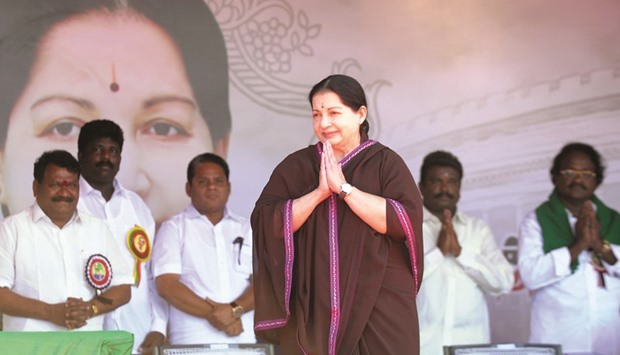Tamil Nadu Chief Minister J Jayalalithaa, one of India’s most popular political leaders, died after a prolonged illness, hospital authorities announced late last night.
“It is with indescribable grief, we announce the sad demise of our esteemed honourable chief minister of Tamil Nadu at 11.30pm today,” Chennai’s Apollo Hospital said in a statement.
Her All India Anna Dravida Munnetra Kazhagam party on Twitter said: “Our beloved leader, the Iron lady of India...Amma, is no more.”
To millions of her followers, the chief minister was known simply as “Amma” (mother).
Doctors had been treating the 68-year-old former film star, who enjoys an almost god-like status in Tamil Nadu.
Her body was taken to her residence at Poes Garden and after completion of rituals, will be taken to Rajaji Hall later today.
Police were deployed in large numbers outside the hospital and also at Poes Garden.
The government has announced three-day holiday in view of the mourning period.
Early in the evening, a few television channels erroneously reported that the chief minister had died, triggering emotional responses among AIADMK supporters assembled at the hospital and at party offices across Tamil Nadu.
The hospital then released a bulletin that she was continuing to receive life support treatment.
The AIADMK top brass met shortly before the hospital bulletin to discuss a possible succession plan, according to reports.
Jayalalithaa’s trusted man, O Panneerselvam, was picked to helm the state.
When Jayalalithaa’s mentor M G Ramachandran suffered a stroke in 1984 and was taken to the US for treatment, his portfolios were allocated to senior cabinet ministers Nedunchezhiyan and P S Ramachandran.
Though MGR, as the then chief minister was popularly known, resumed charge in six months, he had serious speech impediment till the end.
When he died in 1988, AIADMK saw a power struggle and multiple splits, followed by an electoral debacle in 1989, before Jayalalithaa’s faction consolidated and returned to power after the dismissal of the rival Dravida Munnetra Kazhagam government, in alliance with the Congress, in 1991.
The AIADMK is comfortably placed with 134 seats in the 235-member assembly.
But the main opposition has not had so many legislators in the recent past as the DMK has now (98).
The question is whether the AIADMK will be able to retain unity now, analysts said.
Hundreds of devotees have kept a round-the-clock vigil outside the hospital since she was first admitted in September suffering from a fever.
Their numbers have swelled since her condition worsened on Sunday.
Earlier yesterday, scuffles broke out outside the hospital as many from the thousands of her supporters tried to break through the police barricades.
The police and security presence had been beefed up across the state, fearing chaos from the chief minister’s angry and emotional followers.
Jayalalithaa had earned the loyalty of many voters in the state with a series of highly populist schemes, including “Amma canteens” that provided lunch for just Rs3.
She was also one of the country’s most polarising politicians, accused of being dictatorial and was even jailed for corruption.
Several of her supporters resorted to self-harm when she was briefly jailed in 2014 on charges of corruption.
Her conviction, later overturned on appeal, sparked mass protests and even some reported suicides.
Thousands of directors, actors and producers in the Tamil film industry went on hunger strike to demand her release.
Prime Minister Narendra Modi offered his condolences over her demise.
“I will always cherish the innumerable occasions when I had the opportunity to interact with Jayalalithaa ji. May her soul rest in peace,” Modi said on Twitter.
President Pranab Mukherjee said he was “extremely sad” as the country lost “a visionary leader.”
In a condolence message to Governor Vidyasagar Rao, Mukherjee said the country “has lost an icon who was loved and admired by millions”.
He said Jayalalithaa was “a visionary leader and administrator who distinguished herself through her political acumen and people friendly programmes.
“She was regarded one of India’s most charismatic and popular leaders.”
The president recalled that he used “to interact closely with her when we were together in the Rajya Sabha and during her different tenures as chief minister.”
“She was progressive in her thought and pro-active in pursuing the issues that were close to her heart, such as the empowerment of women and welfare of children,” he said.
“She served the country with distinction in different capacities, including as member of parliament, member of the Tamil Nadu legislative assembly, the first woman leader of opposition in the legislative assembly and as five times chief minister of Tamil Nadu.”
Mukherjee said as chief minister, Jayalalithaa introduced a number of pro-poor schemes in various fields, including education, food security, provision of safe drinking water and the girl child.
“Her life was dedicated to the socio-economic transformation of Tamil Nadu and its people. Her contribution to the progress and development of Tamil Nadu will be long remembered.”
Jayalalithaa demise: Panneerselvam sworn in as Tamil Nadu chief minister
CHENNAI: O Panneerselvam was sworn in as chief minister of Tamil Nadu at a low profile event at the Raj Bhavan in Chennai in the early hours of Tuesday, almost two hours after J Jayalalithaa passed away at Apollo Hospitals .

This file photo taken on March 27, 2014 shows Jayalalithaa gesturing as she arrives at a public meeting in Puducherry. The charismatic chief minister of Tamil Nadu died after a prolonged illness yesterday.
